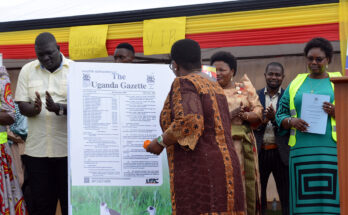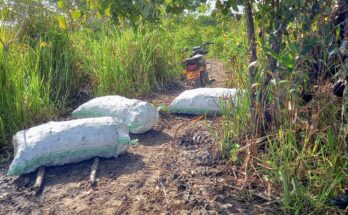In November last year, Uganda’s National Forestry Authority (NFA) Executive Director, Tom Obong Okello revealed during the COP27 – a global climate conference – that Uganda would be launching a “10-year-reafforesation program” to restore forest loss and wetlands, adding that it would also help offset carbon emissions and “become a source of carbon credit” in future.
“We will train forest rangers too,” he said. This was shortly after the launch of the African Carbon Market Initiative (ACMI), in Egypt Sharm el Sheik, whose goal is to “unlock the potential of voluntary carbon markets for financing Africa’s energy, climate and development goals”.
“They will help maintain and protect these forests – and this would help the country earn more [revenue] from carbon markets because we are losing a lot of money in that sector,” Mr Ogwang added.
Currently, Uganda emits 5,674 tonnes mainly from agriculture and land uses. These numbers, however, will shoot up by a million folds, scientists say, if the East African nation goes ahead to export oil upon completing the 1,443 km East Africa Crude Oil Pipeline (EACOP) that will pump up 34 million tonnes of carbon emissions.
Already burning fossil fuels is the major driver of climate change globally. Africa, the least of the emitters of greenhouse gasses, with just 4 per cent, is the most vulnerable to climate-related crises. And yet, as global temperature levels continue to tick up and rainfall patterns become erratic, small-holder farmers, who constitute the biggest number and rely on rain-fed agriculture in Africa, are finding it tough to have reliable harvests.
The Uganda government believes that having enough carbon thinks – by planting trees – would have double benefits like sucking out planet-warming greenhouse gasses from the atmosphere and earning from carbon credit which can later be invested in renewable energy. However, experts believe this move only gives air-tight excuses for polluters in the global north to continue emitting more thus exacerbating the climate crisis.
“Carbon markets are a new form of colonialism from the global north which gives them permits for polluting more,” Amos Wemanya, the lead expert on Just Transition aspects at Power Shift said during at the Second Science Café recently organized by Media for Environment, Science, Health and Agriculture (MESHA) ahead of the COP28 in November this year.
“The carbon credits by countries from the global north don’t meet the real price of the [carbon] projects. What is paid to developing nations is just a fraction which doesn’t even cover all the costs involved,” he Wemanya added.
Last year at the cop27, known as the ‘African cop’, the ACMI was launched to “grow African credit retirement from 19 folds in 2020 to 300 meta tonnes of carbon emission every year by 20230 (and up to between 1.5 and 2.5 gigatonnes of carbondioxide by 2050).
Despite the bright spots in that projection, Mr. Wemanya still believes that “[the ACMI] is not different from the previous carbon markets” initiative, adding that “much of the revenues earned from the carbon markets will still be shared among the developers of the projects and the middle men thus leaving out the indigenous and local communities”.
Therefore, Mr. Wemanya notes, “Africa needs global solidarity to support its fight against climate crisis” since it’s the most affected and yet the least emitter of greenhouse gasses.
“We need to demand for our fair share of the climate finance to build resilience through grants-based funding and not high interest loans that will only sink Africa deeper into debt,” Mr. Wemanya said
Sunita Narain, the Director General of the Centre for Science and Environment, notes that the entire carbon market scheme needs to be “redesigned,” saying that it is “opaque and secretive” only benefits the global north.
“We need a people-centered scheme if the carbon credits are to benefit the communities otherwise it becomes an immoral scheme if they expect behavioral change [in terms of supporting carbon credit initiatives] and there is no direct share of the credits with the communities,” she said.
“Because there is no transparency, the real price from the carbon credit is not paid fully which makes it hard for the communities to benefit. Africa is only reaching for low hanging fruits”.
Ephraim Shitima, the Chairman of the African Group of Negotiators, expressed concerns over delay in funding mitigation and adaptation actions since the Paris Agreement was signed to limit global temperature well below 2 degree Celsius in 2015.
The goal now, he added, is “to ensure that the push for adaptation efforts are on the same level as mitigation,” arguing that “ this robust framework will make it easier for us to track progress in terms of mobilizing and measuring for resources for climate action”.
“COP28 is the year of global stock take,” he said, adding that “it takes over from COP27 whose important milestone was establishing a loss and damage fund”.




